Overreach? Brevard Sheriff Wayne Ivey tries to influence public policy beyond policing
The banner on the Nov. 28 Facebook video blared: "Breaking news! It's time to put discipline back in our schools!!"
But when the video opened, rather than fading to the Brevard Public Schools headquarters in Viera or any of the 85 district-run schools throughout the county, it was on the Brevard County Jail. In center frame, surrounded by high chain-link fences ringed with barbed wire, with a gun on his hip, was Brevard County Sheriff Wayne Ivey.
It was, Ivey declared, a "brand new day" for student discipline in the public school system.
"If you're a little snot who is coming into our classes to be disruptive, you might want to find another place to go to school, because we're going to be your worst nightmare starting right now," Ivey said.
More:Sheriff Wayne Ivey announces a 'brand new day' for discipline at Brevard schools
School Board Chair Matt Susin, who appeared in the video alongside Ivey and State Attorney Phil Archer, said while conversations between unions, district administration, the Board and law enforcement about discipline had been going on behind the scenes for months, the idea for the video with the jail as backdrop, was the sheriff's doing.
It is not the first time that Sheriff Ivey has sought to exert his influence beyond his role as the county's chief law enforcement officer. Over the last several years, Ivey has inserted himself into various non-policing debates, from emergency management to selecting candidates for public office to involvement in county politics over children's services, mask mandates and other issues.
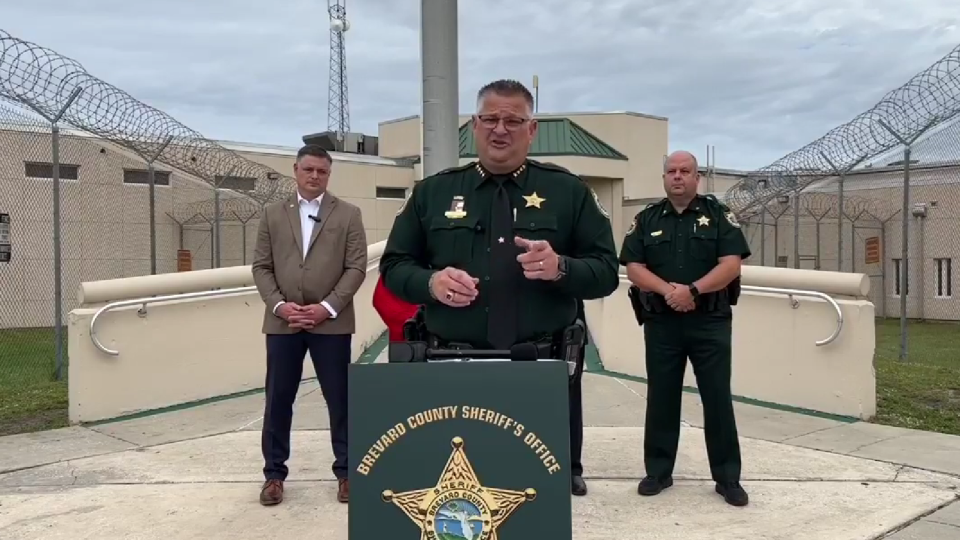
Like most things the sheriff touches, his involvement sets off a chorus of cheers from his most ardent supporters and outbursts of anger and disbelief from his detractors
The school video made national news, alarming many parents and angering some leaders in Brevard's Black community. It also caused headaches for other School Board members and school district leaders, many of whom didn't know it was happening until the video was live on the Brevard County Sheriff's Office Facebook page.
"Perhaps we should review our contract with the sheriff's office," said School Board member Jennifer Jenkins at a Dec. 8 special board meeting to address the discipline issue. "Because as far as I remember, we don't work for him."
Ivey later sought to clarify that his agency was "not in the discipline business." But the incident was the latest example of the sheriff using the role of his office to exert control over the domains of other county agencies. The question is why?
Some critics have accused the sheriff of trying to shoulder his way into other agencies in a bid to expand his influence or the size and scope of the sheriff's office budget. Others see his actions as one of a leader taking charge of issues on which others have dropped the ball.
While Ivey did not respond to questions for this story, he has suggested in interviews with conservative media that he has a desire to see all levels of county government unified under a common ideology — one in which, on one view, the county sheriff is the ultimate local authority.
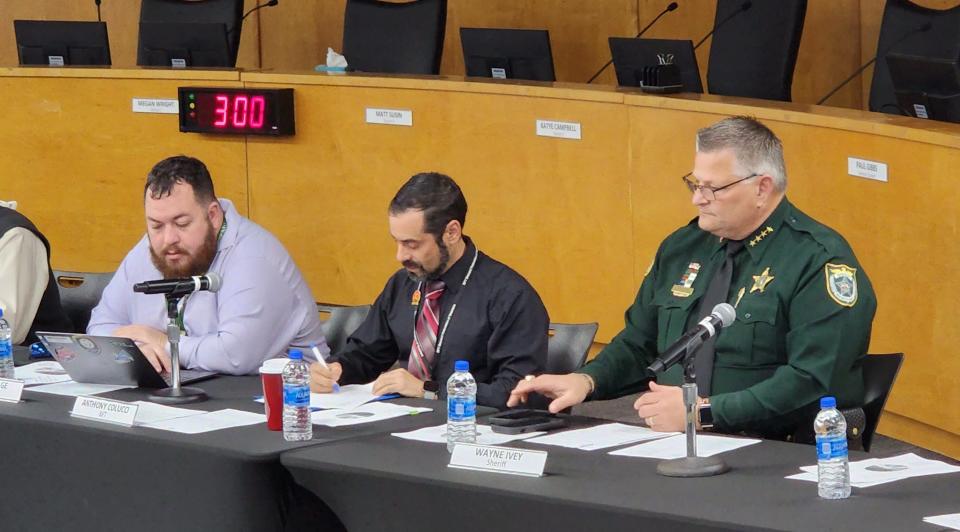
'It was the sheriff's video'
The video made national headlines almost as soon as it hit Facebook. Initial coverage of Ivey's claim that students were no longer afraid of having the "cheeks of their asses torn off" led to questions about whether the sheriff was endorsing a return to corporal punishment.
The frustrated some School Board members, who were left to mollify concerned parents. Some blamed the frenzy on the media coverage or political partisanship, while also distancing themselves from the video.
"I got a phone call from NBC News — national news — last week wanting to know if we are doing corporal punishment. I watched the press conference. That's not what you said," Board member Katye Campbell told Ivey at the Dec. 8 board meeting. "But the perception is that we're about to reinstitute corporal punishment."
More:Discipline stirs passions at Brevard School Board meeting but few concrete actions
"My frustration is that we didn't know," Campbell said at the meeting.
Asked the day before the Dec. 8 meeting, Susin said he was "taking it on the chin for what people believe occurred" with the video.
"There's a lot of people out there that are misinterpreting the truth and facilitating and enhancing a lot of these fears, and those kinds of people can go to hell," he said.
Still, he said, he understood some of the concerns. He said he had wanted to film the video in front of the School Board building, but that would have taken time to arrange and the sheriff wanted the news out quickly.
"The sheriff just said: "Look, this is out of control. Let's have a press conference. Let's bring it to the forefront, and then let's call a special meeting.' And I said, 'Let's do it.' And that's how it just happened. It was just like bam, bam, bam," Susin said.
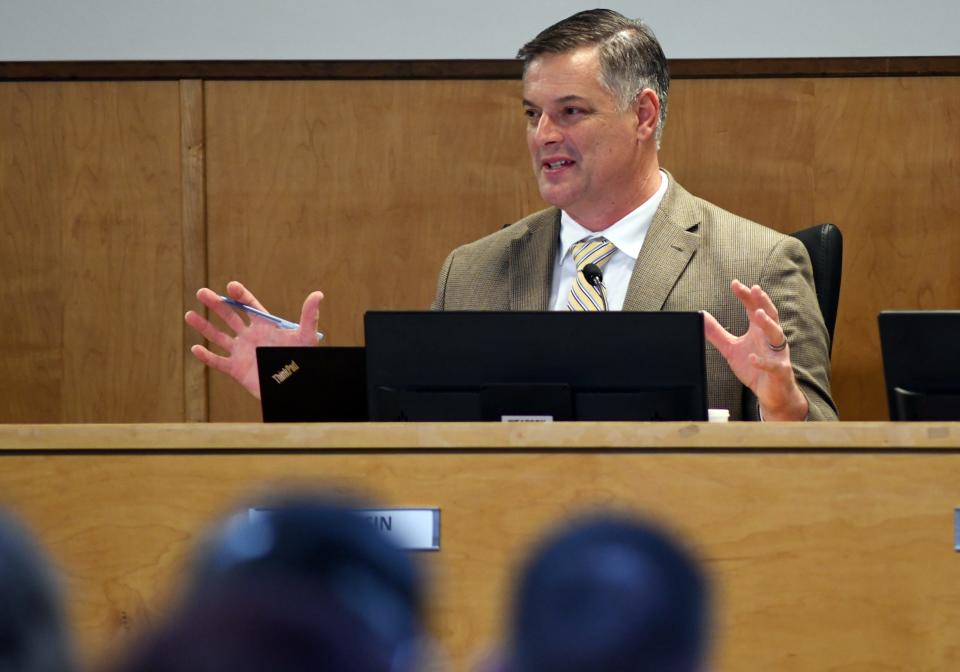
Jenkins said she had spoken separately with several high-ranking BPS cabinet members, who told her most of them only found out during an unrelated cabinet meeting the morning the video aired.
"Dr. Mullins definitely didn't know about it. Our communications guy didn't know about it. I know for a fact our COO (chief operating officer), who is in charge of district security, didn't know about it," Jenkins said.
Russell Bruhn, the district's chief strategic communications officer and a member of the superintendent's cabinet, declined to talk on the record about the incident.
"If it was a Brevard Public Schools video, it would have been done differently," Susin later said, "but it was the sheriff's press conference and video. So, he asked us to be a part of him saying that, is what basically happened."
Deepening rifts
Susin said the sheriff was just trying to bring attention to the problem. It worked. In national media outlets, Ivey was suddenly the face of discipline in a Florida public school district portrayed in the midst of an out-of-control behavior crisis.
He was a featured guest on a Dec. 17 episode of the Fox News talk show Cross Country with host Lawrence Jones, discussing school discipline meltdowns. Space Coast Daily, which the sheriff has often granted exclusive access to press conferences and news releases, depicted Ivey as the "'New Sheriff' at BPS" in a Dec. 12 print headline.
But while some loved the message, the video ruffled the feathers of many. Some Black leaders, already concerned about disproportionately high discipline rates for Black students in the district, were angered by what they saw as threatening — even vaguely racist — comments by the county sheriff.
That came to a head at the Dec. 8 special meeting , which brought together the sheriff, the School Board and local representatives of the NAACP, among others to discuss the issue.
The sheriff sought to clarify during the meeting his office "wasn't in the discipline business," but added that the line between where the job of schools ended and his began was becoming "blurred."
"Our job is to deal with the criminal element that happens on our school campuses," Ivey said. "But what's happening is that line is becoming blurred, because many of those issues you've heard about sitting at this table that should have been handled as a criminal issue never got to us."
The explanation didn't do much to calm tempers.
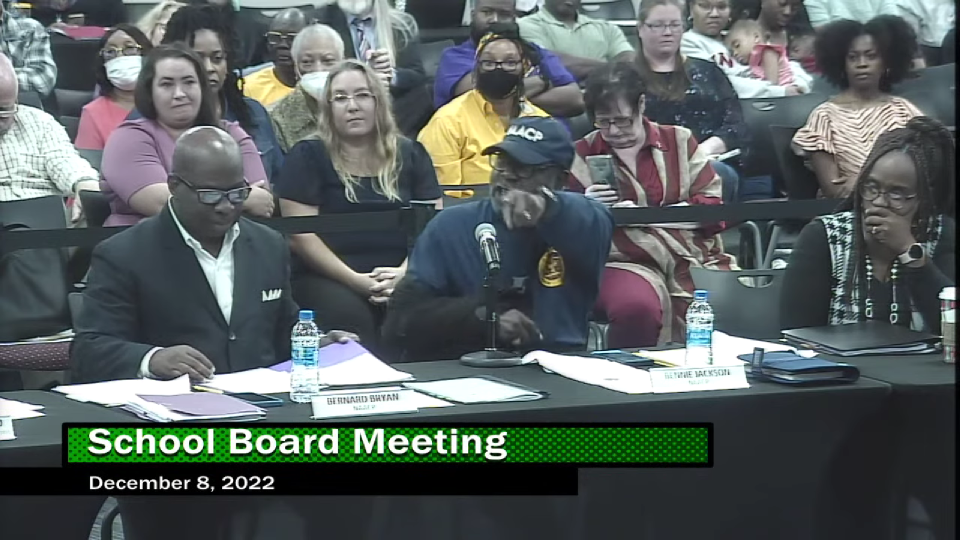
"Our children are not clowns. They're not snot-nosed," Bennie Jackson Jr., a vice president for the South Brevard NAACP, told Ivey, referencing comments from the video the sheriff had aimed at misbehaving students. Jackson went on to call Ivey's comments "threats," "bullying" and "scare tactics."
Susin, charged with maintaining order at the meeting, tried to cut Jackson off but backed down when Ivey motioned at him. "Mr. Chairman, let him ramble," Ivey said.
Brevard attorney Alton Edmond, a former public defender who works with at-risk families and children, said many in the communities he serves were "angered, troubled and upset" by the video.
"These are communities that already have a lot of distrust for Ivey and law enforcement sometimes because of the way they are treated, so a lot of them saw it as a dog whistle," said Edmond, who ran against Ivey for sheriff as a Democrat in 2020.
"The message that he is giving is that there are some children that cannot be taught, and those children should be abandoned and imprisoned," Edmon said. "I think that's a very troubling concept when we consider the state of education in Brevard, especially when it comes to Black and brown minority students."
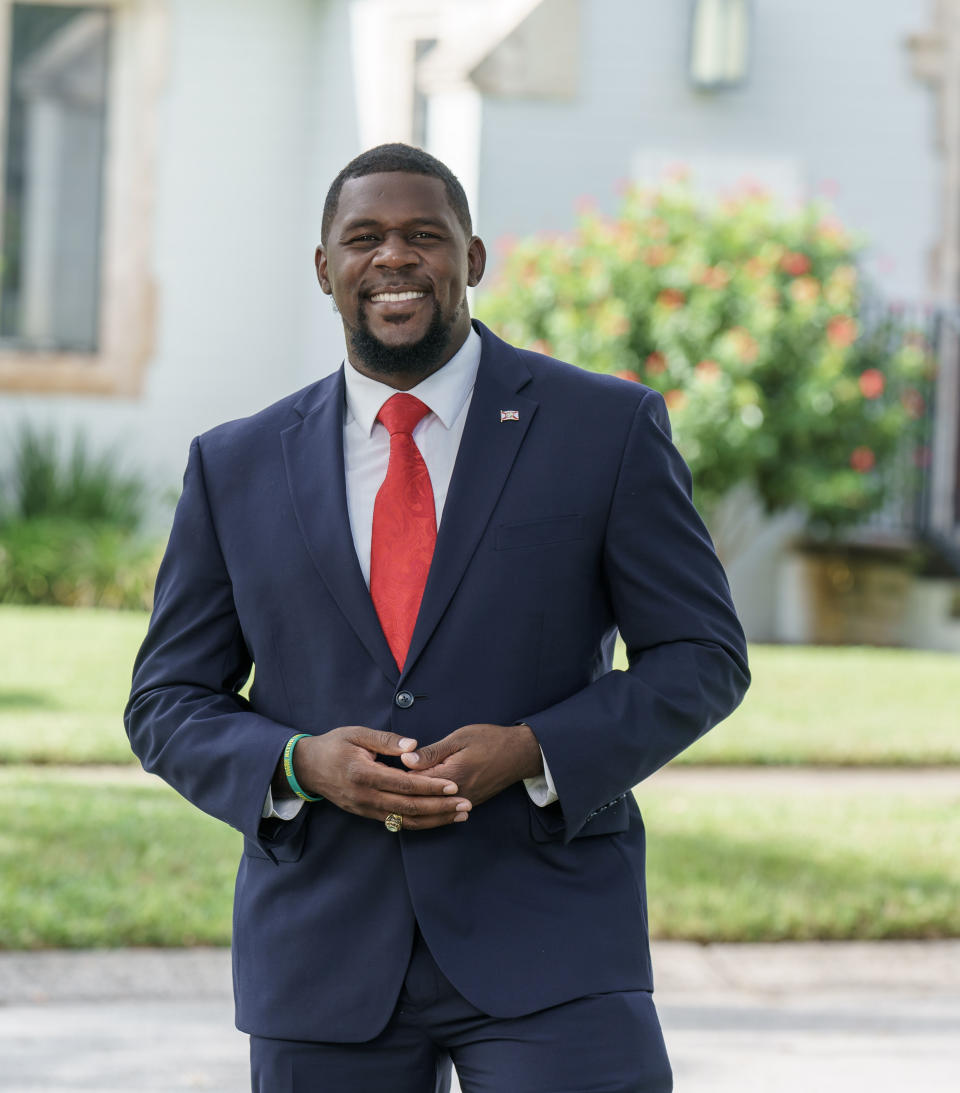
The video may have further damaged relations between BPS and some Black parents and leaders which had already taken a hit with the removal of Superintendent Mark Mullins, who had made racial equity a focus during his tenure. Mullins was unceremoniously ousted by a newly conservative School Board in November.
More:Judge candidate says Ivey offered to help secure appointment if she dropped out of race
"Some of them believed they had some kind of relationship or support from the school system. They definitely did with Dr. Mullins," Jenkins said. "Then for that video to come out, it felt like another attack on a minority population."
Ivey left the Dec. 8 meeting shortly before public comment. Many among the 37 speakers that signed up to talk were critical of the video.
Not the first time
Ivey's attempts to insert himself in front of public crises — without sufficient communication with those actually in charge — have caused problems before.
During Hurricane Dorian in 2019, the sheriff used Facebook to become the face of the county's emergency management efforts, broadcasting an evacuation order in a video 18 hours before the timeline decided on by a Brevard emergency operations policy group.
In another instance, Ivey's Facebook Live announcement that he intended to close the causeways for inspection the morning after the storm went out at the same time as an official message stating the roads would remain open. Another announcement the next morning that he was closing the causeways caught staff off-guard, sending them scrambling to provide confirmation of the closures through official channels.
More:Sheriff Ivey and Brevard emergency officials send mixed messages during Dorian
The conflicting messages muddled communications with Brevard residents, leading to confusion and drawing critical comment from a former head of the Federal Emergency Management Agency.
"It sounds like a lack of coordination," Craig Fugate, Gov. Jeb Bush's former emergency management chief and head of FEMA under President Barack Obama, told FLORIDA TODAY in 2019.
County officials blamed themselves rather than the sheriff for what they called the series of "miscommunications," despite the fact that the sheriff initiated some of the announcements on his own and did not attend at least one meeting in which some of the timing decisions were made. (A member of his command staff represented Ivey at the meeting.)
Ivey's assumption of public communications during Dorian proved to be a prelude to a takeover attempt of the emergency management office in 2020 after the county's emergency management director, Kimberly Prosser, resigned for a job in the private sector.
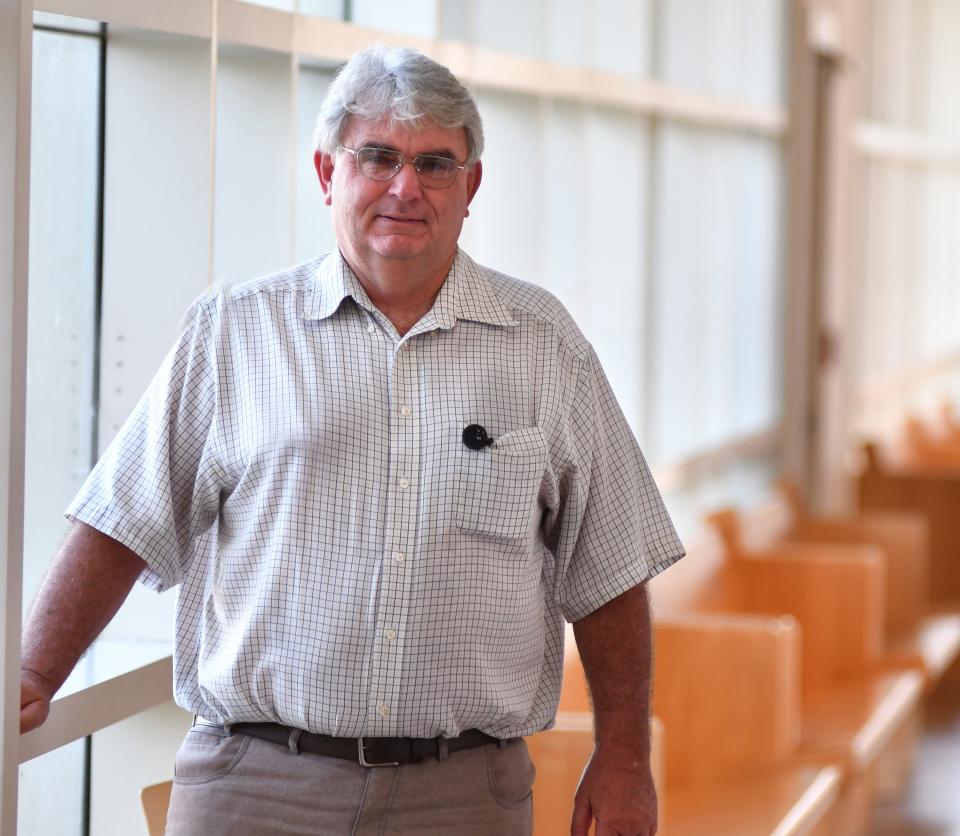
Ivey has worked to influence policy before
Scott Ellis, former longtime Brevard County Clerk of Courts, blamed the Dorian snafu on county commissioners, some of whom supported Ivey’s bid to run the county’s emergency operations.
“The Board is all kowtowing to the Sheriff and let it happen,” Ellis said in a recent email to FLORIDA TODAY.
Ellis, who had many public clashes with the sheriff before Ellis’ retirement in 2020, has long criticized Ivey for his apparent desire to always be in front of a camera and the sheriff’s deep involvement in local elections, especially the county commission.
More:County report cites challenges related to sheriff taking over Emergency Management
That’s created an environment where no one seems willing to hold Ivey accountable for his overreach, he said.
“In Brevard County there is absolutely no check and balance on the Sheriff and Sheriff’s Office,” Ellis told FLORIDA TODAY in the email.
Ivey has attempted to use those relationships to influence policy decisions over which his role as chief law enforcement officer gives him a foothold, and even some where it doesn’t. Those efforts have often been successful.
In March last year, the sheriff killed a proposed repeal of the county’s “open container” law, which forbids public drinking on most county streets, sidewalks and parking lots.
Strong initial support from the board evaporated at the next meeting after Ivey failed to sign off on the proposal, telling commissioners that repealing the law could make it harder for deputies to approach people they suspect of other crimes.
The incident prompted Commissioner John Tobia, who introduced the repeal, to quip that Ivey was a “wonderful guy” but “not a policy maker.”
More:County Commission nixes 'open container' repeal, considers extended drinking hours
“It’s our job to make policy and his job to follow said policy,” Tobia said at the March 9, 2021, meeting.
Ivey’s often repeated assertion amid the COVID-19 pandemic that his agency wasn’t the “mask police” was put to the test last year when a spike in cases led the 18th Judicial Circuit to institute a mask mandate at the Brevard County courthouse.
The sheriff was open about his ultimately unsuccessful efforts to overturn the mandate in a Space Coast Daily video posted Aug. 23, 2021.
More:Chief judge: Brevard judges voiced concern about COVID surge, prompting order for masks
“I have expressed my concerns and my opposition to our chief judge,” Ivey said in the video. “I am bound by law to enforce it, but I am not happy about it, and I’ve spoken to the chief judge, and I am planning to continue to try an address this issue.”
Elsewhere, Ivey’s influence has allowed him to impact decisions that have little to do with policing.
Commissioners referenced Ivey’s lack of support for the Children’s Services Council, a special taxing district to fund programs for Brevard children, during a 2019 decision to dissolve the council. The move killed the languishing district before it could seek funding through a ballot referendum that would have raised local property taxes.
“(Sheriff Ivey) was asked, and he didn’t believe in this either,” Commissioner Kristine Zonka said during the Jan. 22, 2019 meeting, adding that Ivey has long supported various children's charities. “I’m not going to speak for him, but he didn’t want to advocate for this because I’m sure he has the same concerns that I do, at least as far as what the role of government is.”
Six months later, the Commission approved a property tax hike that exceeded a county charter-imposed cap to fund a “critical needs” budget increase for the sheriff’s office, at Ivey’s request.
'Something about that just seems wrong'
Ivey's exact intentions for involving himself in the school discipline debate are not clear. He did not respond to an interview request for this story.
Ellis has said Ivey's past takeovers of duties formerly managed by other agencies, including animal services and Canaveral Port Authority law enforcement, his attempted takeover of emergency management as well as his outsized influence over county politics, have amounted to "empire building."
"Bigger empire, more jobs," Ellis said in the recent email.
Edmond said he was concerned by Ivey's entanglement in recent School Board elections for similar reasons.
"What I see, and what many people from the community see, is Ivey using his attachment to the School Board and his power over the School Board, because he influenced those elections," Edmond said.
Ivey endorsed new School Board members Gene Trent and Megan Wright and supported Campbell's reelection bid in this year's elections and was accused by one of Trent's District 2 challengers, Shawn Overdorf, of trying lure Overdorf from the race with promises of a paid political job.
More:‘Constitutional Sheriff’ Wayne Ivey says he’s a patriot. Others see something more menacing.
The sheriff's efforts to expand his influence could reflect an idea of civic authority which Ivey has endorsed in the past and which, on some views, holds up the county sheriff as the ultimate authority figure.
In an April 2021 episode of the conservative podcast Liberty Monks, Ivey said his vision of county government included a unified interpretation of the Constitution, shared across all levels of elected office.
"We put focus and vigilance on some what we deem are the more important offices, maybe it's sheriff, maybe it's prosecutor. We often don't put that same thought process and diligence into our judicial elections, into our school board elections, into our municipal elections," Ivey said on the podcast. "And what we find is people that aren't standing up for the Constitution."
"We've got to get back to thinking across the board that every elected office is important," he said.
The idea is a central pillar of the "Constitutional Sheriff" movement, a controversial conservative movement that sees the county sheriff as the final arbiter of laws and Constitutional rights, over even the U.S. Supreme Court.
While Ivey has never publicly stated his agreement with that view, he self-identifies as a "Constitutional Sheriff," has vocally supported some of the movement's affiliated organizations and had close associations with some of its leaders, including Arizona Sheriff Mark Lamb and the movement's founder, former Arizona lawman Richard Mack.
Whatever Ivey believes about the limits of his authority, Ellis said he was deeply skeptical of the sheriff's ability to control discipline in Brevard schools.
Under current policy, law enforcement's main role in patrolling behavior is the investigation and arrest of students suspected of committing crimes on campus, BPS spokesman Russell Bruhn said. Noncriminal infractions and decisions regarding disciplinary actions are handled entirely by the school district, Bruhn said.
“BCSO cannot do School Discipline," Ellis said in an email. "Now obviously Ivey can talk, and the School Board may listen (or not) but BCSO cannot be inserted in the discipline chain of command."
More:BPS will discuss possible discipline changes with panel of teachers, parents and others
But the sheriff doesn't need to hand out detentions to use the situation to his advantage, according to Edmond. All he has to do is make more arrests.
"This is an opportunity for him to increase arrests, to ask for more funding so he can build bigger facilities and expand his power, his reach and his territory off of the backs of school-aged children ," Edmond said. "Something about that just seems wrong."
Eric Rogers is a watchdog reporter for FLORIDA TODAY. Contact Rogers at 321-242-3717 or esrogers@floridatoday.com. Follow him on Twitter: @EricRogersFT.
This article originally appeared on Florida Today: Florida sheriff tries to influence public policy beyond policing

